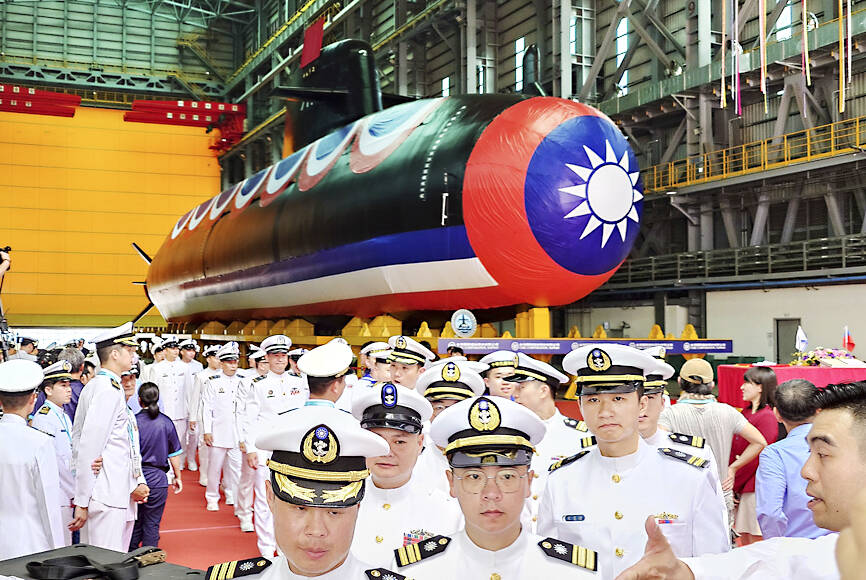Taiwan’s first indigenous defense submarine prototype, the Hai Kun (海鯤, SS-711), is undergoing a harbor acceptance test, a navy official said yesterday.
Admiral Huang Shu-kuang (黃曙光), who heads the Indigenous Defense Submarine program, said that personnel are training on the Hai Kun’s systems and equipment, and the next step would be a sea acceptance test (SAT) in the second quarter of next year.
The submarine was initially launched on Sept. 28, after seven years in development, he said, adding that the program has been supervised and audited by the Legislative Yuan, the Control Yuan and other government agencies, and no problems have been found.

Photo: Chiang Ying-ying, AP
Before the SAT, officials would thoroughly test all of the Hai Kun’s equipment and systems to ensure it operates within specifications, he said.
Rumors that the SAT would be conducted in the first quarter owing to progress on the harbor acceptance test were untrue, a source speaking on condition of anonymity said, adding that the tests would proceed according to the original schedule.
The Hai Kun has already passed inspections of its welds and watertight components, the source said.
The submarine’s development has become an election issue, with opposition candidates saying they would investigate people involved in the program over allegations they leaked information to China.
Huang has concerns about the program, and during a recent interview with the Nikkei newspaper, he said the program has received affirmation from US defense analyst H.I. Sutton, as well as Kazuki Yano, a former submarine fleet commander in the Japan Maritime Self-Defense Force.
Commenting on the Hai Kun’s NT$49.3 billion (US$1.58 billion) price tag, Huang said that the need to cooperate with international contractors for some components that Taiwan does not make contributed to the submarine’s cost.
In terms of domestic expenses, the cost included the construction of five workshops that made parts for the vessel, the purchase of automatic plate rolling machines, automatic welding machines, pipe bending machines and precision drilling machines, as well as two storage facilities for spare components, he said.
The amount also included labor, domestic and foreign materiel, and consultation fees for shipyard construction and naval technical assistance.
Citing an example of foreign procurements for the submarine, Huang said the US supplied 18 MK-48 torpedoes and spare parts.
Foreign procurements accounted for 60 percent of the submarine’s total costs, he said.
“The program was carried out in accordance with the laws, and was subjected to five special reports and on-site inspections by the Legislative Yuan,” he said. “The Control Yuan also conducted three special reports, and the National Audit Office conducted three financial audits.”

MAKING WAVES: China’s maritime militia could become a nontraditional threat in war, clogging up shipping lanes to prevent US or Japanese intervention, a report said About 1,900 Chinese ships flying flags of convenience and fishing vessels that participated in China’s military exercises around Taiwan last month and in January last year have been listed for monitoring, Coast Guard Administration (CGA) Deputy Director-General Hsieh Ching-chin (謝慶欽) said yesterday. Following amendments to the Commercial Port Act (商港法) and the Law of Ships (船舶法) last month, the CGA can designate possible berthing areas or deny ports of call for vessels suspected of loitering around areas where undersea cables can be accessed, Oceans Affairs Council Minister Kuan Bi-ling (管碧玲) said. The list of suspected ships, originally 300, had risen to about

DAREDEVIL: Honnold said it had always been a dream of his to climb Taipei 101, while a Netflix producer said the skyscraper was ‘a real icon of this country’ US climber Alex Honnold yesterday took on Taiwan’s tallest building, becoming the first person to scale Taipei 101 without a rope, harness or safety net. Hundreds of spectators gathered at the base of the 101-story skyscraper to watch Honnold, 40, embark on his daredevil feat, which was also broadcast live on Netflix. Dressed in a red T-shirt and yellow custom-made climbing shoes, Honnold swiftly moved up the southeast face of the glass and steel building. At one point, he stepped onto a platform midway up to wave down at fans and onlookers who were taking photos. People watching from inside

Japan’s strategic alliance with the US would collapse if Tokyo were to turn away from a conflict in Taiwan, Japanese Prime Minister Sanae Takaichi said yesterday, but distanced herself from previous comments that suggested a possible military response in such an event. Takaichi expressed her latest views on a nationally broadcast TV program late on Monday, where an opposition party leader criticized her for igniting tensions with China with the earlier remarks. Ties between Japan and China have sunk to the worst level in years after Takaichi said in November that a hypothetical Chinese attack on Taiwan could bring about a Japanese

STREAMLINED: The dedicated funding would allow the US to transfer equipment to Taiwan when needed and order upgraded replacements for stockpiles, a source said The US House of Representatives on Thursday passed a defense appropriations bill totaling US$838.7 billion, of which US$1 billion is to be allocated to reinforcing security cooperation with Taiwan and US$150 million to replace defense articles provided to the nation. These are part of the Consolidated Appropriation Act, which the US House yesterday passed with 341 votes in favor and 88 against. The act must be passed by the US Senate before Friday next week to avoid another government shutdown. The US House Committee on Appropriations on Monday unveiled the act, saying that it allocates US$1 billion for the Taiwan Security Cooperation Initiative